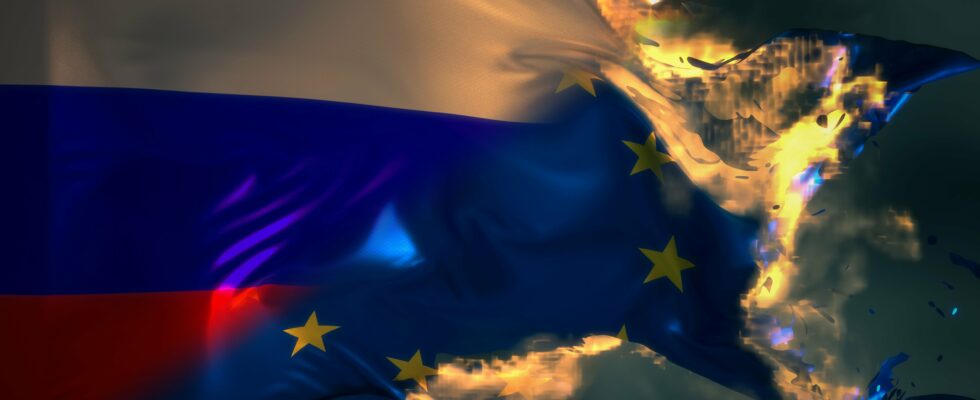4,000 false bomb threats sow panic in Lithuanian schools; a mysterious fire devastates one of Poland’s largest shopping centers; the anchor of a container ship stops a pipeline linking Estonia to Finland; in Strasbourg, a Latvian MEP maintains a correspondence with the FSB, while in Paris, three individuals place fake coffins at the foot of the Eiffel Tower in broad daylight, covered with a banner reading “French soldiers of Ukraine”.
Welcome to Europe, target of all foreign interference. “I have long kept a list of all these maneuvers, which range from classic disinformation to full-blown sabotage. But today there are too many, I can no longer keep track of them!” despairs Nathalie Loiseau, president (Renew) of the security and defense subcommittee in the European Parliament.
“Funny war”
Russia, China, Iran, Qatar, Turkey, Azerbaijan… More and more states are leading a conflict on the Old Continent that does not speak its name. “We are in a funny war, where the attribution of all these acts is almost impossible,” notes Franck De Cloquement, expert in strategic intelligence. Behind these attacks, the same design: to weaken the democratic Europe that these authoritarian states abhor and seek, by all means, to destabilize.
What better time than the European elections? From June 6 to 9, 50 million citizens choose the next 720 MEPs. From Vilnius to Paris, the secret services are on edge. “We fear a major offensive during the election,” says a French government source. “No one has forgotten the Slovak legislative elections at the end of 2023…” Just before the opening of the polling stations, a pseudo-recording of the centrist candidate, Michal Simecka, leak on social networks. He tells how he will manipulate the votes to win. A “fake” published in the middle of the reserve period. Impossible, therefore, to deny it. The day after the election, won by the pro-Russian populist Robert Fico, the European Commissioner for Transparency, Vera Jourova, spoke of an “unprecedented wave of disinformation […] from the far right, but also from pro-Kremlin sources”.
Fueled social tensions
Since the war in Ukraine, “we have clearly noted an increase in the intensity of these attacks”, worries MP Constance Le Grip (Renaissance), at the origin of a law on foreign interference, currently being adopted. “The attacks are increasingly sophisticated,” adds this specialist, who is very familiar with Russian operating methods. “They are fueling social tensions and national divisions.” By evoking, for example, the French colonial past. Or by setting up operations in the “physical world” before amplifying them on social networks, like the red hands sprayed on the wall of the Righteous at the Shoah Memorial on May 14.
The closure, in Europe, of the state media RT and Sputnik and the expulsion of hundreds of spies did not have the hoped-for effect. “On the contrary, these measures have encouraged the Kremlin to innovate in the way it collects information about our societies,” observes Elisabeth Braw, associate researcher at the Atlantic Council. Like this recruitment method spotted by Vilmantas Vitkauskas, head of the National Crisis Management Center, in Lithuania: “On Telegram, Russian services target discussion groups where a certain distrust of local governments is expressed and offer money for targeted actions, such as fires Acts paid in cryptocurrencies between 20 euros and 50,000 euros For our services, it is complicated to intervene because they often involve unsuspected profiles, without any. criminal record”.
“Foreign powers increase their pressure”
Faced with these all-out offensives, Europe is not up to the task. “We asked for the creation, in Brussels, of a counter-espionage department, in vain,” regrets Nathalie Loiseau, for whom the problem also comes “from the difficulty of coordinating 27 intelligence services, some of which have real flaws of security”. According to our information, the creation of a post of commissioner responsible for security issues is being discussed in Brussels… but not before the arrival of the next Commission, at the end of 2024!
By then, Russian, Chinese and Qatari termites will have further undermined the European house. And not only its political and societal foundations, but also the basis of its power, the economy. Here again, Europeans are struggling to assess the threat. “Theft of intellectual property, takeover of strategic sectors… Foreign powers are increasing their pressure, warns Jérémie Gallon, lawyer and specialist in European issues. Their goal is clear: to carve up Europe, degrade its capacity for innovation for prevent us from becoming a major economic player. On the other hand, we remain in denial, unable to coordinate. It is urgent to have an agency dedicated to economic security in Brussels.
In short, the situation is serious. “Let’s organize the response! exclaims Constance Le Grip. Unlike the Baltic countries, which have developed a collective ‘fighting spirit’, the awareness of the population is, here, too weak. We must, alongside the State, create a citizen front, especially as the risk will increase, with increasingly sophisticated attacks, with the help of artificial intelligence.” At the Quai d’Orsay, the subject is on everyone’s minds. Barely appointed, Jean-Noël Barrot, Minister Delegate for Europe, called on February 20 for the creation of a European “democratic shield”, a formula since taken up by the head of the Commission, Ursula von der Leyen. It’s never too late.
.
